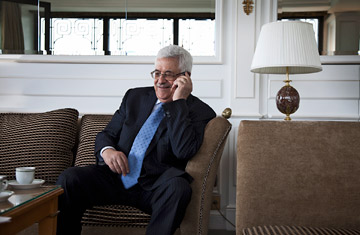
(3 of 6)
Silencing the Guns
It's a painful paradox for the Palestinians, who watch the years pass without a peace deal and with ever growing numbers of Israeli homes appearing in the West Bank: Abu Mazen has done more in the past few years than any Palestinian ever has to keep Israelis safe. "I all the time go against the stream," he tells Time, in what he calls "my broken English." "I tried all the time to say exactly what I feel, what I think, without any propaganda, without any cover, without everything. When I ran to the elections, the first thing I said is I do not accept the armed struggle. No, I don't like it. I don't want it. I will prohibit it."
And he did. Missiles still fly out of Hamas-controlled Gaza from time to time, but according to the U.N. Office for the Coordination of Humanitarian Affairs, which tallies every reported incident on occupied territory, most violence in the West Bank is now committed by Israeli settlers against their Palestinian neighbors rather than the other way around. There have been spectacular exceptions, including the March 2011 slaughter of five Jewish settlers in their West Bank home. But month by month, the Palestinians tend to be the victims of violence rather than the perpetrators. In Qusra, south of Nablus, a mosque was set afire in September 2010, its walls spray-painted with "Muhammad is a pig." The Israeli human rights group B'Tselem this year videotaped Israeli soldiers standing by as settlers fired on Palestinians. Abbas takes each incident as a test of Palestinian forbearance. "They think we will respond with terror," he says and raises his gaze. "We will disappoint them."
Hesitant as Abbas may be to take on Washington--to spare President Obama any unpleasantness, Abbas will not ask for a General Assembly vote until after the Nov. 6 presidential election--the iron grip of his Palestinian Authority on would-be resistance fighters is unquestioned. This has remade the Palestinian-controlled parts of the West Bank into the turf not of terrorist militias but of disciplined uniformed forces, adamant about keeping the peace. "We are living in our best, most convenient security conditions since--ever," Amos Gilad, the No. 2 official in Israel's Defense Ministry, said last year. "No terror." Says a Palestinian teenager in Ramallah's central market: "If you even dream about throwing a rock, they arrest you."
The formula for this transformation is no secret, but neither do Palestinian Authority officials like to publicize it. One part is the U.S. investment in training Palestinian security forces (money for security accounted for some $147 million of the $384 million that congressional Republicans delayed over the first U.N. bid, contributing for a time to a $1 billion PA budget shortfall). Part two is even more sensitive: the Palestinian authorities coordinate daily with Israel's domestic intelligence service, stalking militants as they plot attacks on Israel. The resulting security architecture has brought law and order (emphasis on the "order," note human rights activists who compile complaints of mistreatment and even torture by the Palestinian security services) to a region controlled not long ago by militias and thugs.
